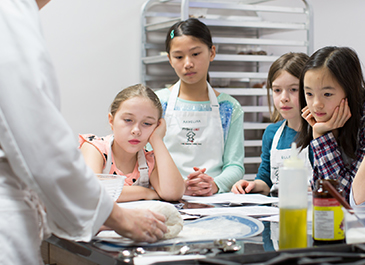“Food is better when you make it yourself.” Grade Four Project CHEF Student
The research on what we should consume to ensure a healthful diet is staggering. A diet consisting of real food—food that is as close to nature as possible and minimally processed—is agreed upon as necessary for optimal health. Yet, many of us still wonder what we need to be eating. Cooking—even as a child—is a great place to start. It helps ensure the food we eat is healthier, as home-cooked meals are generally lower in salt, sugar and fat and closer to the food source than packaged or restaurant food.
In Project CHEF programs, we teach children from kindergarten to grade seven the knowledge and skills to create wholesome meals for themselves. Students also cook up a lot more than food: confidence, pride, team-working skills and increased preference for newly introduced food. What we’ve discovered is that when children cook something they are pretty pleased with what they’ve created—and they will eat it. Getting them involved in the process also empowers them to make wholesome meals for themselves and sets them on a lifelong path of healthful eating.
Parents who volunteer in Project CHEF classes are often surprised by how competent the children are when cooking. But when children are taught basic skills and rules of kitchen safety, there is no stopping them as they become capable, keen cooks. To encourage your children to cook and become more engaged with the food they eat, here are simple tips to ensure they do so safely with tasty results:
Read a recipe all the way through, making sure you have the ingredients and equipment needed and
enough time to finish the recipe. Set out everything you need on your counter before cooking.
Remember: a clean cook is a safe cook. Wash your hands with soap and warm water before you start
cooking and many times while cooking. Be sure your workspace is clean and free of clutter. Wash all
fruits and vegetables before cutting, cooking or eating.
Ask an adult to help you, if you are unsure of the process or have difficulty with a task.
Follow the safety rules. Roll up your sleeves, tie back your hair, remove dangly jewellery and wear
closed-toed shoes before cooking. Always wipe up spills immediately to avoid slipping. Do not keep
perishables at room temperature for more than 2 hours.
Respect the kitchen, equipment and ingredients. Be mindful that farmers worked hard to grow the
food, so don’t waste anything.
Handle sharp edges carefully. This refers to knives, graters, peelers and blades from blenders and food
processors. When chopping, hold the item firmly with fingertips in a claw position. Also, store sharp
items in a safe place—not in the sink.
Tidy as you go and when you have finished cooking, clean up, compost and put everything away.
Barb Finley is the Director and founder of Project CHEF, a non-profit society that runs school and community programs. An educator and chef, Barb is a passionate advocate for teaching children how to cook. She has developed culinary programs at Choices Markets and throughout Greater Vancouver. For more on Project CHEF visit projectchef.ca.

